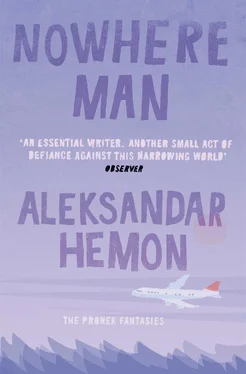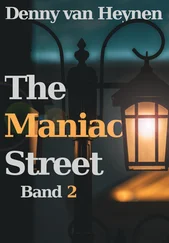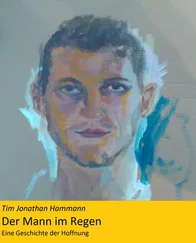I can safely say that Jozef’s conscious life fully began the day he looked at the sleeping Grandma Natalyka and her face was much too tranquil: no snoring, no nose-hair shudder. Her body warmth slowly vanished, as Jozef lay facing the wall, trying to convince himself that if he went to sleep and woke up a little later, she would be back in the kitchen, banging the pots. But he couldn’t fall asleep, constantly tickled by the thought of death sharing the bed with him. He looked at her again, and her eyes were only half closed; he could see the glassy corneas. It seemed that she was looking at him through the slits from somewhere far away, and he could not think of any reason why she wouldn’t come back. Everything in the room was perfectly still, as if it all went away with Grandma and only left its shapes behind.
Thus death entered Pronek’s life. He watched his mother sob and his father cry, and a procession of black-clad people, towing unnaturally quiet children through their apartment, as if through a train station. He felt guilty for not being able to produce a respectable amount of tears. In a moment of inspiration, which was to provide a sentimental delight to his family for years to come, Pronek cut an onion in half and applied the halves to his eyes, producing more tears than necessary and a couple of hours of complete blindness.
Pronek’s early boyhood was spent shedding the stigma of cuteness signified by the pom-poms and frills, by his round cheeks and girlish curls. Wearing a Grandma-produced sweater, Pronek crawled under steam trains lounging in the train station near his home and pulled plugs that made the steam go shshhshhs and produce fluffy clouds. He fought as a foot soldier in a street war against the kids from the Tito building (it had a huge Tito picture on its top), under the command of the boy who called himself Zagor Te Nay, after a comic book character. Jozef talked his friends into eating some wild fruit that looked like grapes, but were possibly poisonous and tasted bitter and disgusting, thereby experiencing early the bliss of leadership. He won the game that consisted of collecting points for lifting miniskirts of the young women walking down the street. He stuck nails into electric outlets and threw rocks on streetcars. No one would have thought of Pronek as a cute six-year-old when he spat at his father and told him to fuck off, after Pronek Sr. demanded from him an apology for calling his mother a bleating sheep. Pronek Sr. sentenced Pronek to twenty-five lashes, the execution scheduled for the time between the evening cartoons and the news. It was furthermore judged that school, beginning that fall, would still allow enough time for mischief, and Pronek was enrolled in English and accordion lessons the next day.
In the tiny workshop of his mind, Pronek can assemble a model of the English classroom in the Pioneer Center Blagoje Parovi  . The room is dark green, because of the heavy green curtains filtering the sunlight beating at the windows. There is a map of England, with London like a wound in its side, ruptured blood vessels stretching toward Scotland and Liverpool. There is a poster with two cartoon men (their heads square, their eyes dots, their noses sharp angles) shaking hands, and saying: “How do you do? My name is——.” The green coating makes the teacher look like a corpse, with her sagging cheek apples and thin, tight lips. (Mirza, who is to become his best friend, is reading comic books under the desk. Pronek can see Mandrake hypnotizing two goons with guns: they stand petrified with glassy eyes.) The teacher raises her hand with its mauve claws and they all start singing: “Catch a falling star and put it in your pocket, save it for a rainy day.”
. The room is dark green, because of the heavy green curtains filtering the sunlight beating at the windows. There is a map of England, with London like a wound in its side, ruptured blood vessels stretching toward Scotland and Liverpool. There is a poster with two cartoon men (their heads square, their eyes dots, their noses sharp angles) shaking hands, and saying: “How do you do? My name is——.” The green coating makes the teacher look like a corpse, with her sagging cheek apples and thin, tight lips. (Mirza, who is to become his best friend, is reading comic books under the desk. Pronek can see Mandrake hypnotizing two goons with guns: they stand petrified with glassy eyes.) The teacher raises her hand with its mauve claws and they all start singing: “Catch a falling star and put it in your pocket, save it for a rainy day.”
The English classes were bearable in comparison with the accordion classes. The accordion torment was conducted by a music teacher with a thick, brushy mustache, who clearly hated his students. They sat with the heavy accordions in their laps, stretching the beasts across their narrow chests, repeating the simple melodies (“Little Gypsy Girl Steps into the Water”) over and over again, melodies that Pronek carried home in his head, resulting in dreams with Grandma Natalyka playing the accordion up to her ankles in icy water.
The first day in school sums up well Pronek’s early educational experiences: droves of girls with nicely combed hair shimmering under sunlight; the pleasant contrast between their navy blue school uniforms and virginally white stockings; mobs of boys, tripping each other, causing sprained wrists and severe elbow injuries; a spitting contest, won by one Amir, who could spit between his teeth, like a snake; Mirza reading comic books under the desk ( Prince Valiant ); a gentle boy, with longish, dark hair, sniveling in the front row, while his mother poked her head into the classroom, speaking to him sotto voce. The teacher, an auntly woman who spoke with stern inflections and wrote with the fountain-pen point upside down, touched the boy’s head with her gnarled hand, but it helped little — he kept bawling, a little puddle of tears forming on the desk in front of him.
The first day they learned that Nature was everything that surrounded them; that Tito was president; that the most important thing in our society was preserving brotherhood and unity; and that our planet was in the Solar System, which was in the Milky Way, which was in the Universe, which was everywhere, much like Nature. The knowledge imparted was significant only in its eminent uselessness: when his parents asked him what he had learned that day in school he said: “Nothing”—the word that he was to use throughout his schooling to describe his progress.
The only thing that distinguished Pronek in school was that he never, ever volunteered to do anything: no question was worthy of a voluntary answer; no task was challenging enough for him to step out of his daydreaming. In parent-teacher conferences, the teacher told Pronek’s parents that he had potential , delivering her verdict with a grimace of mild disgust, as if potential were an odorous skin condition.
Through the fifth grade they learned more about Nature, though Society entered the picture in the fourth grade (Pronek liked Society more than Nature); they read books about freedom-loving forest animals (“The Squirrel’s Little House”) and lonesome dwarves (“The Dwarf from a Forsaken Land”). Nor was their physical development neglected: they climbed ropes, and rolled medicine balls in circles like disoriented dung beetles. On state holidays, they celebrated Tito’s birthday and other important dates from the proud history of socialist struggle and self-management. The school choir sang appropriate songs about miners striking and dying for freedom, about the revolution akin to a steely locomotive.
Pronek liked singing, but he preferred the songs they learned in the English classes at the Pioneer Center: “My Bonnie Lies over the Ocean”; “Yellow Submarine”; “Everybody Loves Somebody (Sometimes).” He would sing at the top of his lungs at home, to the dismay of his parents, too tired to tolerate Pronek’s roaming up and down the scales. Besides, they did not understand English, which was why they were suspicious regarding the real content of those foreign songs: drugs? prostitution? masturbation? Those songs were so much unlike the songs the elder Proneks liked to sing: the quiet Bosnian songs, sung in the spirit of calm realization that life would pass like spring bloom and that there was nothing but infinite darkness in the end. They demanded to know what in the world was Jozef singing about. At first he refused to divulge the real content of the songs, but then started to make it up, enjoying his power over his ignorant parents. Thus “Yellow Submarine” was about a balloon that wanted to be free; “My Bonnie Lies over the Ocean” was about a little squirrel that was run over by a big, bad truck, but was then resurrected and lived in Grandma’s pantry; and “Everybody Loves Somebody (Sometimes)” was about a burglar who stole from rich old people and gave to poor kids. “Nice,” said the parents, as the idea of social justice appealed to them. Still, his father, a police inspector, maintained his suspicion and decided to find and enlist a colleague who could speak English enough to decode the lyrics — a failed attempt as none of his colleagues spoke any foreign languages.
Читать дальше

 . The room is dark green, because of the heavy green curtains filtering the sunlight beating at the windows. There is a map of England, with London like a wound in its side, ruptured blood vessels stretching toward Scotland and Liverpool. There is a poster with two cartoon men (their heads square, their eyes dots, their noses sharp angles) shaking hands, and saying: “How do you do? My name is——.” The green coating makes the teacher look like a corpse, with her sagging cheek apples and thin, tight lips. (Mirza, who is to become his best friend, is reading comic books under the desk. Pronek can see Mandrake hypnotizing two goons with guns: they stand petrified with glassy eyes.) The teacher raises her hand with its mauve claws and they all start singing: “Catch a falling star and put it in your pocket, save it for a rainy day.”
. The room is dark green, because of the heavy green curtains filtering the sunlight beating at the windows. There is a map of England, with London like a wound in its side, ruptured blood vessels stretching toward Scotland and Liverpool. There is a poster with two cartoon men (their heads square, their eyes dots, their noses sharp angles) shaking hands, and saying: “How do you do? My name is——.” The green coating makes the teacher look like a corpse, with her sagging cheek apples and thin, tight lips. (Mirza, who is to become his best friend, is reading comic books under the desk. Pronek can see Mandrake hypnotizing two goons with guns: they stand petrified with glassy eyes.) The teacher raises her hand with its mauve claws and they all start singing: “Catch a falling star and put it in your pocket, save it for a rainy day.”










